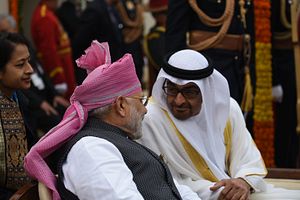The visit of Mohammed bin Zayed, Crown Prince of Abu Dhabi and Deputy Supreme Commander of the United Arab Emirates’ (UAE’s) armed forces, to India on the occasion of the latter’s Republic Day celebrations provided an opportunity for both countries to further strengthen a relationship whose importance will only continue to grow in the years ahead.
The 14 bilateral agreements signed during Zayed’s three-day visit underscores the breadth of engagement that now exists between the two countries. Agreements were signed for cooperation in defense, cyber, space technology, trade and investment, energy, infrastructure, and agriculture, among others. The joint statement affirmed a commitment to a “comprehensive strategic partnership for the 21st century” and hoped to build on momentum from both Prime Minister Modi’s visit to the UAE in 2015 and Zayed’s visit to India through regular high-level exchanges between the two countries.
India and the UAE see each other as vital to their national growth and development. Today, the UAE is India’s third-largest trading partner and total trade between the two countries stands at about $70 billion. For the UAE, India represents its largest export market, buying about 15 percent of its exports. Over 2.8 million Indians (and a significant number of undocumented expatriates) live in the UAE, more than any other country with the exception of Saudi Arabia.
Energy trade is a key component of the strategic partnership between the two countries. India today imports 70 percent of its crude oil from the Gulf. By 2020, India will likely account for 5 percent of global oil demand and will represent the largest share of incremental global oil demand over the next couple of decades. To that end, India and the UAE are in early discussions on establishing a strategic oil reserve in India and enhance cooperation in the crude oil sector.
Prior to his arrival in New Delhi, Zayed tweeted that his country considers India a “linchpin of stability and security in the Asian continent.” These are important words from the putative leader of a country impacted regional tensions and instability in its neighborhood. The war in Yemen and tensions with Iran continue to weigh heavily on the minds of Gulf Arab leaders, even as the U.S. appears less interested in entirely shouldering the burden of being the region’s primary net security provider.
Gulf Arab states will begin to seek partnerships and arrangements with other important actors like India and China to offset gaps left by an American drawdown. During Zayed’s visit, both countries signaled a commitment to conclude a Memorandum of Understanding on Mutual Protection of Classified Information and further enhance cooperation in training, joint exercises and defense production.
India, for its part, already considers the Gulf an extension of its strategic neighborhood and is both willing and able to play the role of a net security provider, including securing energy sea lines of communication from the Gulf to India. Its defense agreement with Qatar, in particular, which commits India to protecting “assets of importance to both countries,” is significant. The Indian Navy today makes regular ports of call in the region and is involved in anti-piracy operations in the Gulf of Aden. On the heels of Modi’s visit to the UAE in 2015, the chief of the Indian Air Force embarked on a four-day trip to Oman and the UAE.
India’s own security concerns in the region also include the impact of political instability on its large diaspora. Indeed, periods of instability in the Gulf have forced India to expend considerable resources to evacuate its citizens from the region: 200,000 from Kuwait and Iraq during the Gulf War, about 25,000 during the Arab Spring, and about 5,000 during Saudi Arabia’s military campaign in Yemen in 2015.
Counter-terrorism cooperation now forms a vital component of engagement between India and the UAE. Where the UAE may have once been somewhat indifferent to India’s concerns on terrorism, concerted engagement by both the Manmohan Singh and Modi administrations has yielded results. Under the bilateral transfer-of-sentenced-persons agreement, the UAE has repatriated individuals India has accused of fomenting terror, including Indian Mujahideen operatives Yasin Bhatkal and Abdul Sattar, and Lashkar-e-Taiba’s Abdul Karim Tunda.
For the UAE, the rise of ISIS and the Gulf state’s experiences in Yemen where 45 of its troops were killed on one particularly bloody day, may in part be driving how the UAE and other Gulf Arab monarchies view violent Islamist groups in the region. Earlier this month in Kandahar, Afghanistan, five Emirati diplomats were killed in an explosion that the Afghan government blames on the Taliban. The attack represents the first instance of the Taliban targeting officials of the UAE, which in the 1990s was one of only three countries to recognize the Taliban government in Afghanistan.
Closer counter-terror cooperation between the UAE and India will help India bring to book operatives and leaders of terror groups in the region, who have historically sought refuge in the Gulf to avoid being apprehended by Indian authorities. India also hopes to that cooperation between the UAE and India will allow it to target criminal organizations such as D-Comany and their assets in the Gulf.
Taken together, Modi’s visit to the UAE in 2015 (the first by an Indian prime minister in 30 years) and Zayed’s visit to New Delhi represents a common desire among the leadership of both countries to significantly enhance bilateral ties. The joint statement sets the framework for an ambitious agenda, but this commitment must be followed up with timely action and implementation if both India and the UAE are to realize the potential of the relationship.

































